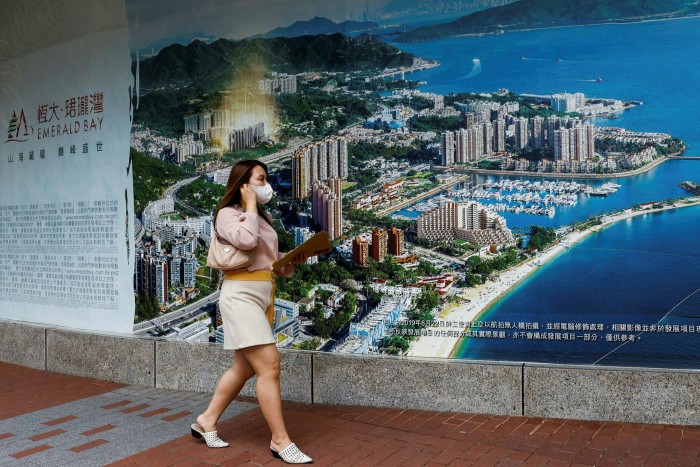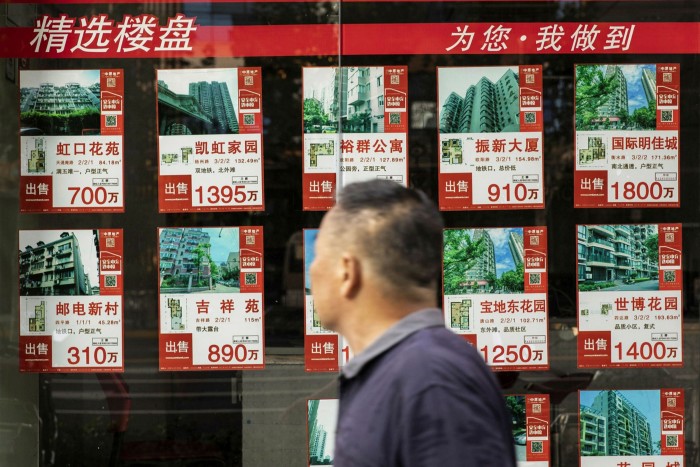Until just a few weeks ago, sales at three residential developments in the eastern Chinese city of Jinan were booming. But in September, traditionally one of the busiest months for purchases of new homes, the mood has soured.
Sales at the projects are flat or declining as authorities tighten access to mortgages, and developers are now offering discounts in an attempt to shift the units — even if it leads to a small loss.
“Government policy doesn’t support home purchases,” said Zhou Miao, a property agent at the Jinan branch of PowerChina Real Estate Group. “Many people have put off their house purchase plans until next year in the hope the authority relaxes credit controls.”
The issues in Jinan, home to 9m people, are part of a nationwide chill sweeping across China’s real estate sector, which has for decades anchored the country’s economic growth but is now under pressure from Beijing as it seeks to rein in debt and bring prices under control.
The crisis at Evergrande, the world’s most indebted developer and a symbol of the leverage that helped fuel China’s urbanisation, has highlighted the government’s precarious position as it grapples with one of the core planks of its economic model.
After initially cutting rates in response to the coronavirus pandemic, the government has over the past year sought to ward off the risk of asset bubbles by cracking down specifically on borrowing from real estate developers.
It has also added limits on mortgage lending and caps on rents in big cities. In cities such as Jinan, where agents estimate it can take as long as two months to get a mortgage approved, authorities have imposed their own constraints on lending.
Across the 70 biggest cities in China, prices of new homes edged just 0.2 per cent higher in August compared with July, official data showed last week — their slowest rate of growth in eight months. Other data, highlighting sharp falls in land purchases and sales volumes, more clearly showed that the government’s measures were beginning to bite.
For many economists, the property slowdown poses a serious risk to a sector that makes up as much as 28 per cent of China’s gross domestic product, according to Bank of America, and which — through its demand for commodities, labour and debt — is one of the world’s most important economic indicators.
“I think this time it’s different,” said Ting Lu, chief economist at Nomura, who recently pointed to a “rapid deterioration” in China’s property data and has drawn comparisons with former Federal Reserve chair Paul Volcker’s attempts to bring down inflation in 1970s America.

“If there’s a deep recession, and if there’s a financial crisis, then of course they [authorities] will back down to some extent, but we are not there yet.”
Lu pointed to data showing the number of new home sales falling 24 per cent year on year in August across 30 cities and land sales collapsing 53 per cent in volume terms across 100 cities. Both metrics deteriorated further in early September, he noted.
Falling sales have also hit Evergrande, which, with almost Rmb2tn ($309bn) in liabilities, desperately needs cash to meet obligations to its suppliers and creditors. Angry investors last week descended on its Shenzhen headquarters demanding their money back as expectations of its failure mounted.
Evergrande’s woes highlight the property sector’s importance to China’s financial system, but its weakness and those of hundreds of other developers in China would also have profound consequences for the wider economy. Property investment rose 7 per cent over 2020 and supported an industry-fuelled recovery that outpaced other big economies.
The flipside of that economic contribution was the threat of instability that prompted warnings from top regulators. As prices soared in big cities such as Shenzhen, the government unveiled “red lines” that limited property developers’ access to debt, as well as constraints on mortgage lending at banks at the start of this year.

China has for years sought to dampen speculation in its housing sector. Wang Menghui, housing minister, said in January that China would not use property to prop up the economy, reiterating President Xi Jinping’s 2017 slogan that houses were for “living in” rather than speculating. The government recently cancelled land auctions in big cities after previous constraints unintentionally stoked price increases
“This time around the policymakers seem to be more persistently sticking to their credit control measures,” said Helen Qiao, head of economic research for Asia at Bank of America, who said the slowdown was “mainly induced by policy tightening”.
Beijing, also regards property as an important part of its push for “common prosperity”. The housing ministry last week unveiled a three-year inspection of the sector, bolstering the government’s push to increase control over sectors from education to tech.
With its wider economic recovery from the pandemic still incomplete and disruptions from a recent spate of new infections exposing lingering weaknesses in consumption, China’s economy is under rising pressure.
Lu noted the fall in land purchases would probably weigh on property investment and demand for construction materials, as well as revenues at local governments that sell land to developers. But others pointed to a link between the common prosperity campaign and Beijing’s approach to property.
“Beijing has more considerations than the economic point of view,” said Larry Hu, chief China economist at Macquarie. “Two to three months of bad data is not going to make [it] loosen [monetary policy]”.
Beyond the data, it is still unclear how central and local governments would react to longer-term weaknesses in a sector that has generated huge economic activity, employment and wealth. In Jinan, one project still has a third of its apartments available almost two years after its launch. It is charging Rmb19,100 per square metre, below its break-even price of Rmb20,000.
“Our top priority is to improve cash flow,” said an official at the company, “instead of profitability.”
For all the latest Business News Click Here
For the latest news and updates, follow us on Google News.
